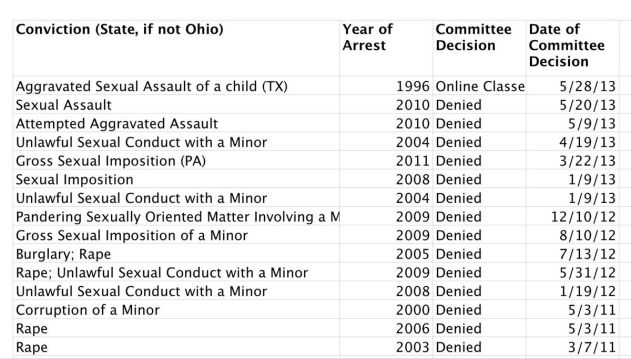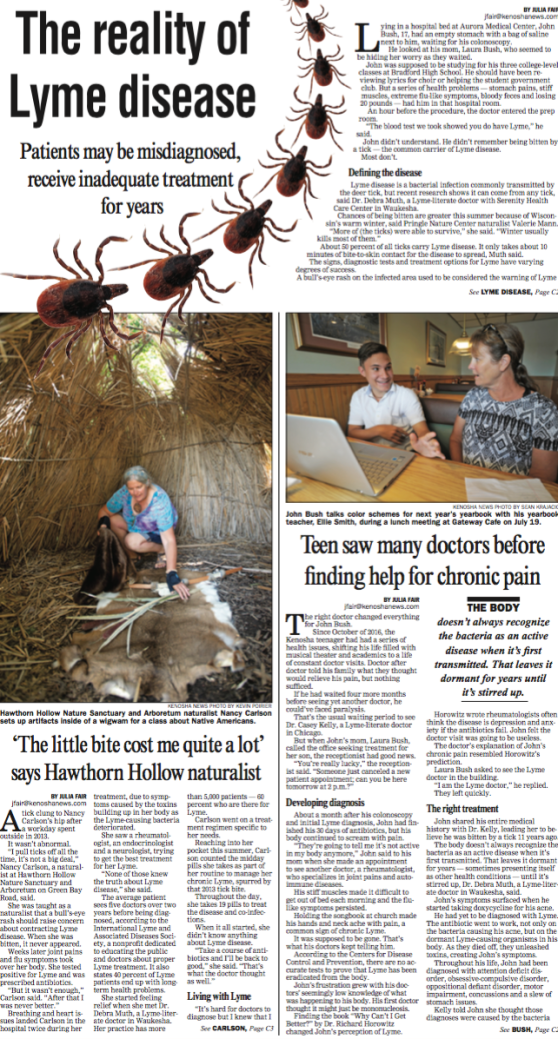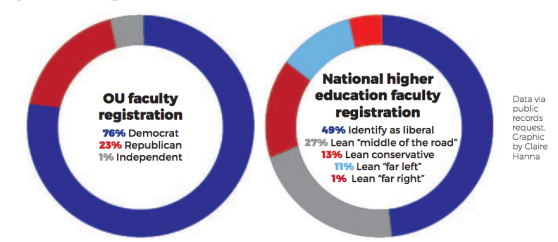By Julia Fair, Athens NEWS Contributor
While the university seldom if ever knowingly admits a sex offender, it likely wouldn’t learn about the offender if the crime occurred when he or she was a juvenile
This past academic year, a registered sex offender became a Bobcat.
Ohio University was unaware while the Athens County Sheriff’s Office built a file of information on the young man.
As required by federal law, the student registered all of his personal information with the Sheriff’s Office. That included his full name, gender, any tattoos, home address, volunteer and school addresses, among other information.
The law enforcement agency didn’t notify the community that the offender had enrolled at OU, though they could have.
In the past, student applicants who have committed sex-related crimes that might have caused them to be a registered sex offender have been barred from attending OU, according to records from OU’s Legal Affairs office.
Between 2010 and 2017, 31 individuals with sex-related criminal pasts were denied attendance on the Athens campus after university officials became aware of their histories.
In 19 of those cases, the sex crimes involved minors.
OU has a Post-Incarcerated Review Committee consisting of representatives from Legal Affairs, Undergraduate Admissions, Student Affairs and the Ohio University Police Department. Those representatives review the files of every student felon who applies to OU, including those convicted of sex-related crimes.
“To be a registered sex offender, a person would almost certainly have been convicted of a felony, which would trigger the review process,” then OU spokesperson Katie Quaranta said in an email from September 2015. “While we consider each case individually, we consider sex offenders very carefully and usually impose significant restrictions, if they are allowed to apply at all.”
Quaranta has since left employment with the university.
Individuals from the committee were unavailable for an interview, Dan Pittman, OU’s media relations manager, said on March 23, 2017.
“If an applicant for admission to the university discloses a prior conviction with ‘sex offender’ status, it is highly unlikely… that the Post-Conviction Committee would approve admission to an on-campus program,” John Biancamano, OU’s general counsel, said in an email in March 2016.
If they are juveniles when they commit the crime, though, those records are not available to the community even after they reach 18.
Usually, when an individual follows a court-mandated sex-offender registration, his or her information is available on the local Sheriff’s Office website. Community members can type their own address in, select a radius of one to five miles from that address, and see how many sex offenders live within that area.
Under Ohio law, a juvenile sex offender (meaning he or she was a juvenile at the time of the crime) would not show up in that public search.
Instead, only the officials in the Sheriff’s Office know about the student sex offender’s registration. Then they decide when and if the university is notified, according to federal SORNA implementation documents.
It’s happened before and can happen again
Above the bars and small businesses, and students scurrying to class on Court Street, an OU student sex offender (a different one from the juvenile offender mentioned at the beginning of this article) rented an apartment and attended classes in 2013.
That student was a juvenile when he committed the sex crime, classifying him as a juvenile sex offender. According to Ohio law, juvenile sex offenders are not published to the Sex Offender Registration Network for community notification. That system holds information about more than 80 sex offenders who live in Athens County.
The student’s Court Street address would not have shown up on one of the aforementioned online searches.
“When you’re convicted as a juvenile, your information never becomes public,” explained Brynne Morris, Sex Offender Registration Network Administrator (SORNA) at the Athens County Sheriff’s Office. “So you may still be required to register but your information is not going to be posted.”
It’s not clear if that juvenile offender’s sex-crime past was reviewed by OU. The records obtained from the office of Legal Affairs dated back to 2010. If the student who lived on Court Street graduated on a four-year track, he would have applied to the university in 2008 or 2009.
Back then, the Sheriff’s Office apparently was still unaware of that student’s Court Street residence, which being located within 1,000 feet of the Athens Middle School would have violated a residential restriction on sex offenders in Ohio.
“He basically moved in there without us knowing and then once we found out, he was charged,” said Sheriff’s Lt. Aaron Maynard, who oversees sex-offender registration for Athens County.
That student sex offender was charged in connection with violating the 1,000-foot limit. All sex offenders are restricted from living that close to a school.
He was set to graduate four months later, but the civil process to remove him from the residence would have taken more time than that, Maynard said.
The student moved out shortly after graduating from OU, following an agreement between his attorney and the Sheriff’s Office.
The Sheriff’s Office, however, didn’t relay that information to university officials sitting in their offices less than a mile away.
The offender attending class this year
In August 2016, the most recent juvenile sex offender registered with the Sheriff’s Office, listing OU as his school address.
The Post-Incarcerated Review Committee did not review this student’s application materials, records show.
The committee did evaluate, however, seven other individuals who committed sex-related crimes before beginning the process of applying to OU to start in August 2016.
Only one was “approved” or allowed to continue the application process after he was found guilty of disseminating material harmful to juveniles in 1997. That adult offender is not a registered sex offender, Pittman said.
Six were denied access to apply.
Those individuals’ crimes include corruption of a minor, unlawful sexual conduct with a minor, endangering welfare of a child, possession of child pornography, lewd acts with a minor, illegal use of a minor in nudity oriented material or performance and rape.
The specific crime the student sex offender who came to campus last August committed remains unknown.
In 2013 and last August, 2016, the Athens County Sheriff’s Office was the only entity that knew the student sex offenders who had committed their crimes while juveniles were on campus. OU apparently did not know about them.
There is no legal requirement for the Sheriff’s Office to notify OU, however, despite federal guidelines advising that it’s a good idea.
Registering at the sheriff’s office
Sex offenders are required to register with the Sheriff’s Office, and although not required by law, the Sheriff’s Office would notify the university if an adult student had registered, then-OU spokesperson Quaranta said in September 2015.
The Athens Sheriff’s Office follows a different protocol for juvenile sex offenders, however.
“We legally can’t call them and say, ‘Hey, this person is taking classes here,’ because we can’t give them that person’s name,” said Lt. Maynard, who also handles sex offenders in Athens County for the Sheriff’s Office, said. “We legally can’t do that.”
The ACSO approach is different from federal guidelines, however.
SORNA Implementation documents suggest that “responsible law-enforcement agencies” develop a policy to notify institutes of higher education when a juvenile sex offender attends a school within the jurisdiction.
The guidelines say the purpose is to provide further guidance to jurisdictions on a variety of topics when implementing SORNA.
The Athens County Sheriff’s Office did not follow those guidelines in August 2016.
When the federal guidelines were shown to Lt. Maynard, he said his office works based on local and state guidelines.
“I can’t speak on a document that does not mention the Ohio Revised Code,” Maynard said.
The Sheriff’s Office decides what kind of notification the community receives about individual sex offenders, including juvenile offenders, based on the ruling of the judge who oversaw the initial sentencing of the sex offender, Maynard said, which is based on the severity of the crime.
“If the Ohio Attorney General gave us updates that would advise us to do something different, we would certainly do that,” he said.
Other schools
Few institutes of higher education in Ohio go beyond SORNA’s suggested practices.
At Ohio University, the only notification measure appears on the OU Police Department website. From there, students can follow a link to the Athens County Sheriff’s Office website where they can access the Sex Offender Registration Network, showing registered sex offenders within a one- to five-mile radius of an address. However, since OU rarely if ever knowingly admits a sex offender to campus, a policy on notification would appear to be unnecessary.
An extensive review of university policies from the 35 public institutes of higher education in Ohio show only five with policies about notifying the campus community of any sex offenders who may be on campus.
The five include Belmont College, Central State University, Hocking College, Lorain Community College and Washington State Community College.
Those policies stem from the federal Campus Sex Crime Prevention Act that went into effect in 2002. That law was intended to guarantee that, when a convicted sex offender enrolls or begins employment at a college or university, members of the campus community will have the information they need to protect themselves, according to Central State’s policies website.
Central State students in Wilberforce, Ohio, near Dayton, rely on the Greene County sheriff’s office to notify campus officials when a sex offender lists Central State as his or her school address so the appropriate notification can be made.
The federal Campus Sex Crime Prevention Act was part of the Jacob Wetterling Crimes Against Children and Sexually Violent Registration Act, a federal law which was repealed when the Sex Offender Registration Notification Act went into effect in 2009.
“Most colleges will still (keep a list) even if it’s not technically a federal standard because it’s just good practice,” said Lori McPherson, a senior policy adviser at the U.S. Department of Justice.
Belmont College officials never thought of dismantling the list once the CSPA was repealed, said R.J. Konkoleski, vice president of advancement and marketing for the school.
“It’s not something we saw a reason to stop, but it’s not something that we necessarily feel obligated by law or otherwise to do,” he said. “It’s been our practice since we had that childcare.”
With Belmont College’s status as a two-year technical school in St. Clairsville, Belmont County, there used to be up to 40 children enrolled at a childcare facility in the same building where a college course was scheduled, Konkoleski said.
“I think the fact that we have that list is a carryover from those times,” he said.
The majority of the schools that keep the lists are classified as community colleges while Central State University in the Dayton area is the only university that keeps a list of student sex offenders.
The local Greene County sheriff would notify the university president or the university police of the registered sex offender on campus, said Laurel L. Wilson, general counsel of Central State. The university would then take steps to notify students, faculty and staff.
“The action is taken to provide protection to the students and staff,” Wilson said in an email.
Hocking College gave similar reasons justifying its student sex-offender reporting policies, citing safety and awareness as its main concern.
“As a professional police department, we advise our community to be aware,” said a Hocking College representative who declined to be identified. “Likewise, we practice this.”
Hocking College’s policy states that students who are required by law to register as a sex offender also must report their status with the college. The Hocking College Police Department then maintains the list of student and employee sex offenders on campus.
Not all colleges or universities have extensive policies about student sex offenders.
“What the policy looks like is going to vary from campus to campus,” McPherson said. “There’s not a set policy or set federal law that governs what colleges have to do.”
The colleges get to set their own standards, McPherson said.
“Even if there’s not a federal standard, even if there’s no best practice or base line, you can still push your campus folks to do more,” McPherson said.








